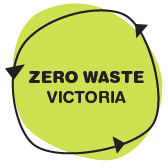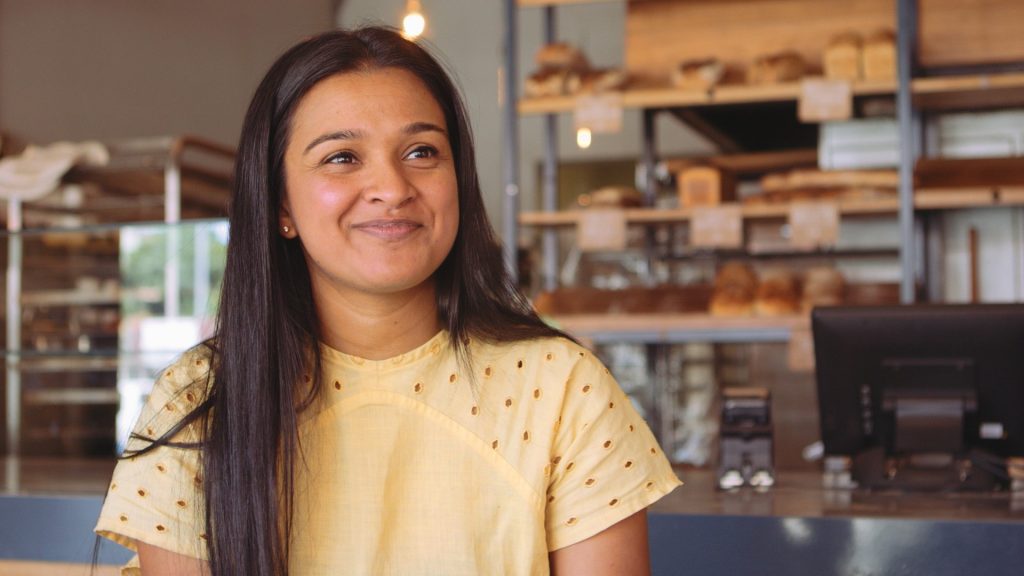
We talk to Hiruni Peiris, the owner of Northcote Bakeshop, who has been working hard to reduce the bakery’s footprint and is trying to make it completely waste free, about making a business less wasteful, encouraging customers to be less wasteful, and how businesses can lead the way by working together with their local community.
One of my favourite zero waste initiatives of yours is Northcote Bakeshop’s loyalty card for using reusables where you get a free loaf of bread after your card has been punched 12 times for using a reusable coffee cup or reusable bread bag or reusing an egg carton. What has the uptake of this been? Has it increased the amount of reusing exponentially? Do you think it has won you more customers and loyalty?
The idea behind this was to encourage people to bring in their reusable items, but over the past 24 months or so, we have noticed that a large number of our local customers – probably over 60% – bring in their reusable items, which means we have saved an estimated six tonnes of carbon dioxide (CO2) emissions in the process just by our customers bringing in their bread bags.
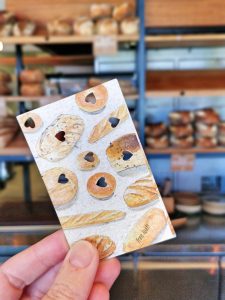
We are trying to come up with ways to convert the other 40%. Our customers don’t bring in their reusables to be rewarded. They do it naturally now and the loyalty card is just an extra bonus. Our local customers have always been quite encouraging when it comes to our zero waste initiatives and this has definitely been an unintentional way of bringing our goals closer to those of our community.
We have seen growth in our core customer base and we have found that our initiatives have activated some of our customers to suggest initiatives of their own.
Do you incentivise customers to be less wasteful and more sustainable in any other ways?
If you buy a coffee cup we will give you your first coffee for free. Also, if you bring in your own egg carton we will give you a discount.
You not only incentivise customers to be more sustainable, you also help them to be more sustainable by offering to take their food waste for composting, collecting hard to recycle items like bread tags and bottle tops for recycling initiatives, by teaching bread making classes, and swapping people from the community’s homegrown produce for loaves of bread. Why do you think it is important for businesses to do this and can doing this benefit a business in any way?
Businesses have the opportunity to lead the way, particularly as they create more waste than regular households and they have the opportunity to work with and influence their local community. We most definitely receive support and patronage from customers who like to consume as sustainably as possible, but the effort needs to honest and humble and an attempt to encompass all parts of the business must be made.
The benefits are not always monetary; however, in the long term, the outcomes can provide a reduction in operating costs, cleaner materials, staff who are a part of a community, and a community that supports their local businesses.
 Food waste is a big one for food-based businesses like yours. What initiatives have you implemented to reduce your food waste and how do you make sure that food scraps don’t end up in landfill?
Food waste is a big one for food-based businesses like yours. What initiatives have you implemented to reduce your food waste and how do you make sure that food scraps don’t end up in landfill?
We know that food waste is a big issue for the environment and businesses are probably the biggest culprits. We also see a great need for food in our community, so through our outreach programmes we are able to give locals a place to go and grab a sourdough loaf that will be part of their weekly routine and diet.
We also try to compost all scraps coming in from the front of house and the kitchen by working as a team and being diligent about making sure it goes in the right sections. Most of our dough waste goes to the pigs at WillowZen farm.
How else have you reduced Northcote Bakeshop’s footprint and waste?
We participated in the Darebin Council’s Green Your Business programme and this has allowed us to look at and implement things such as led lights, a timer on the coffee machine, changing our cleaning habits and products, diverting coffee grounds, growing our own herbs and some veggies, introducing a small retail section for reusable bread bags, asking our local suppliers to avoid things being wrapped in plastic, using sustainable and where possible organic ingredients, trying to hire staff who are local to the area, and trying to trade our waste materials.
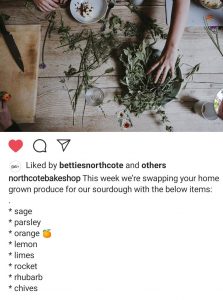 You mentioned to me that there has been a lot of trial and error in your journey. Can you share some examples, what kept you going, and how you got to the right solution for you and your business in the end?
You mentioned to me that there has been a lot of trial and error in your journey. Can you share some examples, what kept you going, and how you got to the right solution for you and your business in the end?
It hasn’t been an easy ride and I would say that at the start we weren’t really sure how to tackle this area of our business. We put a lot of plans on the back burner, which is what happens to a lot of small businesses, usually due to them being time and energy poor. They start off wanting to do the right thing but then find it too hard to choose the right direction and find the right information.
The conversation around how our bakery can be more sustainable started around 5 years ago with a regular customer who has now become a dear friend and mentor for me and for her knowledge, support, and encouragement I will be forever grateful. Being in that mindset, I then met Sara and Emma from Darebin Council, who pointed us in the right direction and gave us the ongoing support to completely transform our whole business.
Regarding sourcing products, we just had to do lots of research to find the right suppliers. Some we found through networking with others and it has been a process of trial and error. I feel the biggest obstacle was challenging myself to change my own mindset and if others can benefit from my knowledge and journey, than that’s a bonus for me.
Why would you suggest that other businesses should follow your lead and start implementing zero waste initiatives?
Because business’s often use more resources than individual people and households and we have the potential to reach an audience of different customers from a variety of backgrounds and all it takes is one person to give you an idea or a new way of doing something and that could be the change that they need. We always feel that we should lead by example and in turn you show your customers and community that together we can change the statistics piled against us.
And, what advice would you give to other businesses wanting to implement similar waste reduction initiatives?
Start somewhere – anywhere! – in your businesses, get information, and get support. There are so many networks out there that are willing to help people gain a better understanding of what they can do. We are also always here to help.
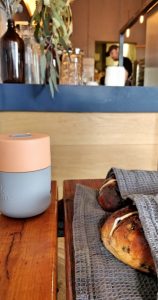 Finally, is there anything you are still struggling with and looking for a solution to and are you planning on implementing any other sustainability initiatives in the future?
Finally, is there anything you are still struggling with and looking for a solution to and are you planning on implementing any other sustainability initiatives in the future?
Yes, we are still a little while away from being 100% zero waste, but we hope that we can achieve this goal. Unlike other businesses, we haven’t put a deadline on this yet, but we keep nudging at it every week.
We are working on a project with some other like-minded businesses to make it easier to create a circular economy within the food industry and that will hopefully help many other small businesses and we hope to launch next year.
Hiruni’s humble approach to improving her business and local community’s sustainability epitomises the ‘think globally, act locally’ principle. She has cleverly and systematically implemented waste reducing initiatives using the resources and help available and offered to her by the local council. This inspiring case study also shows how community individuals, businesses, and councils can together all play a role in creating sustainable businesses and communities and how one individual’s changed mindset can make a difference.
And, I, for one, am very excited to hear more about the upcoming project she is working on and we will be sure to share it with you when we know more.
